Children’s Mental Health Week 2026 – Classroom resources and activities
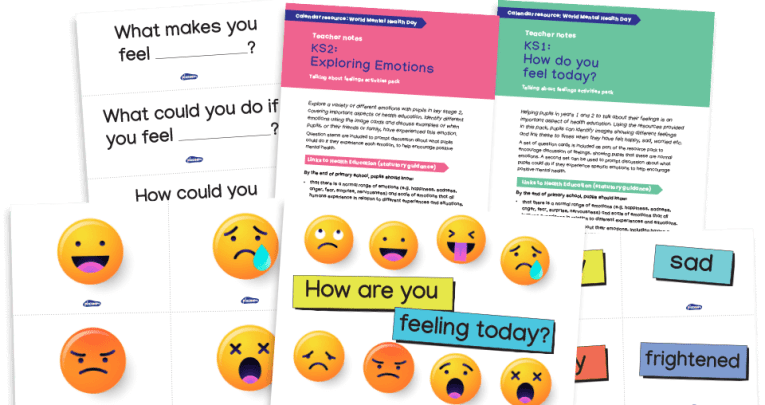
Tackle some serious issues and open a dialogue about mental health in your classroom with these resources…

- by Teachwire
- Classroom expertise and free resources for teachers

Discover a range of inspiring classroom resources and activities to help you support pupils’ wellbeing during Children’s Mental Health Week and beyond…
Table of contents
- What is Children’s Mental Health Week?
- When is Children’s Mental Health Week 2026?
- Children’s Mental Health Week 2026 resources
- Mental health training resources
- How to pick a counsellor for your school
- 7 ways to boost mental health and wellbeing for everyone in your school
- Making mental health a year-round priority
What is Children’s Mental Health Week?
Organised by national charity Place2Be, Children’s Mental Health Week is all about focusing on the importance of children and young people’s mental health.
It’s an important issue, with one in six young people currently experiencing a mental health problem.
When is Children’s Mental Health Week 2026?
Children’s Mental Health Week takes place between 9th-15th February 2026. The theme is ‘This Is My Place’.
Other mental health events
Mental Health Awareness Week takes place in May. World Mental Health Day is on 10th October every year.
Children’s Mental Health Week 2026 resources
KS1/KS2 lesson plan
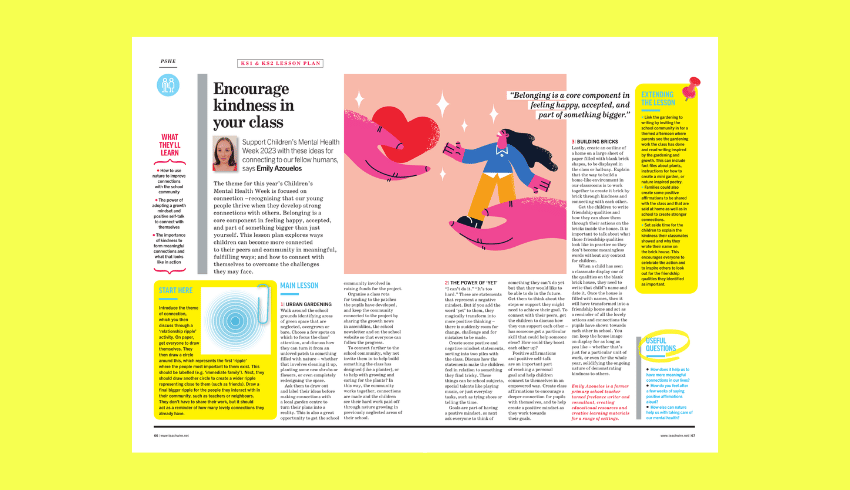
This free lesson plan for KS1 and KS2 explores ways pupils can become more connected to both their peers and their community in fulfilling and meaningful ways. It also touches on connecting with yourself to overcome life’s challenges.
The lesson covers using nature to improve connections, what a growth mindset is and how to use positive self-talk. Pupils will also learn about the importance of kindness and how to put it into action.
Place2Be resources
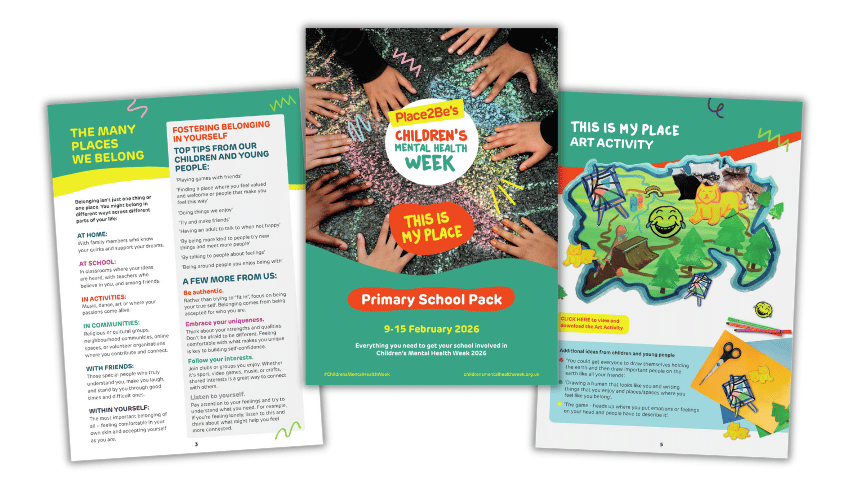
This year, Place2Be is exploring the theme ‘This is My Place’. This free school pack contains group activities, top tips, an assembly guide and information on how to take part in raising vital funds for children’s mental health. There’s also an art project to try.
Key Stage 1 and 2 activity packs
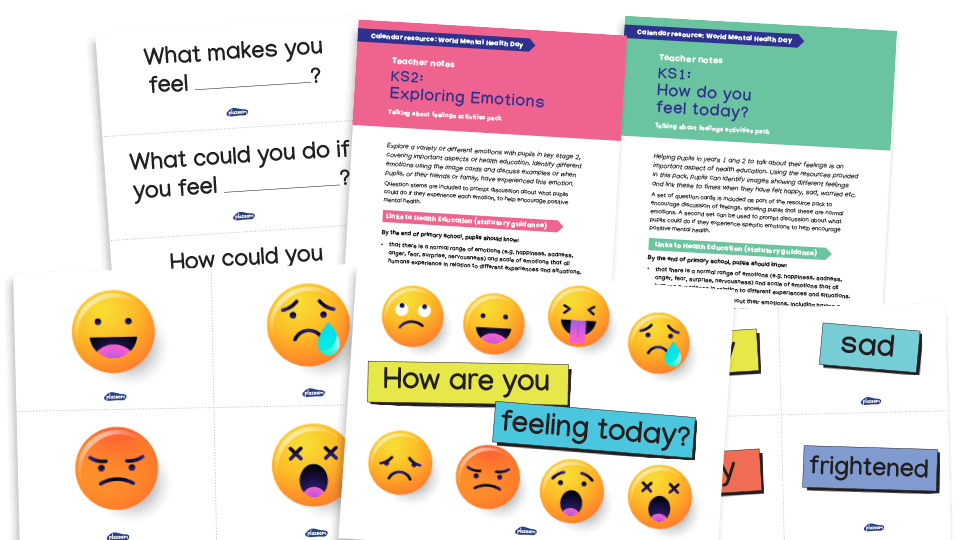
Explore emotions with KS1 and KS2 children with this free bumper activities pack from Plazoom. Help pupils to identify different emotions using the image and word cards and discuss examples of when children, or their friends or family, have experienced these emotions.
You’ll find question cards and question stems included to prompt conversations about what positive steps children can take if they experience a particular emotion.
Activities for both KS1 and KS2 are included, with teacher advice for how to use the resources in the classroom.
Recharging your mental battery
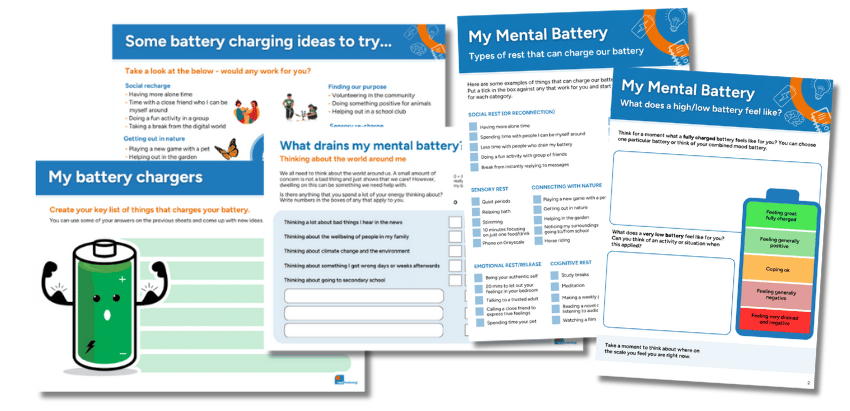
These free mental health worksheets support children and young people in recognising what depletes and replenishes their mental and emotional energy.
With separate resources for primary (Year 5+) and secondary (Year 8+), they promote reflection on everyday challenges and rejuvenating activities, offering practical strategies for maintaining emotional wellbeing.
Mental health activity pack
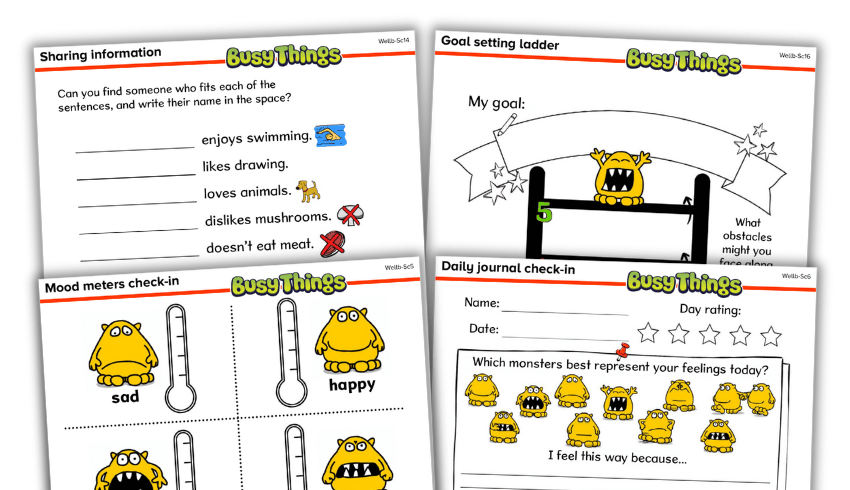
This free resource pack provides a variety of children’s mental health activities, including mood check-ins, mindful colouring and goal-setting, to support emotional wellbeing in your primary classroom.
Kindness assembly
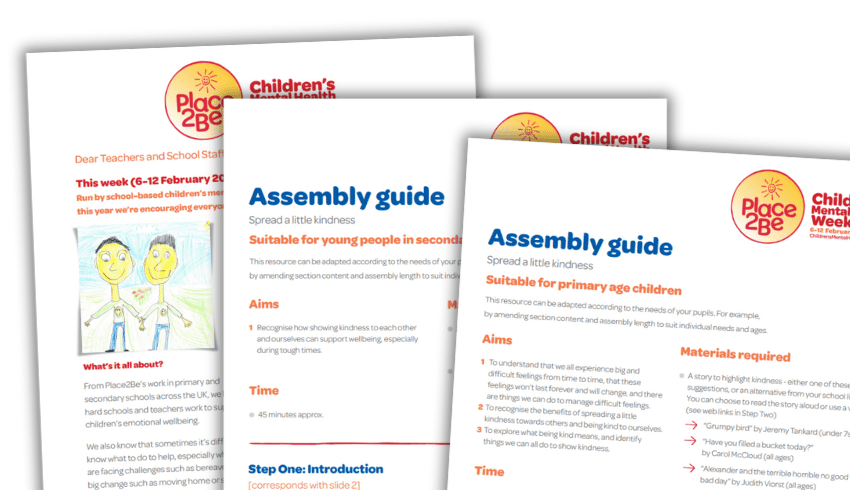
These two kindness assembly resources – one for primary and one for secondary – can help you spread a little kindness in your primary or secondary school. You’ll get slides, teacher notes and recommendations for videos and stories to use in your assembly.
You can also download lesson plans and activities focused on kindness from charity 52 Lives. The charity is also hosting two virtual assembies for KS1/2 on 9th Febuary.
Things That Make Me Happy
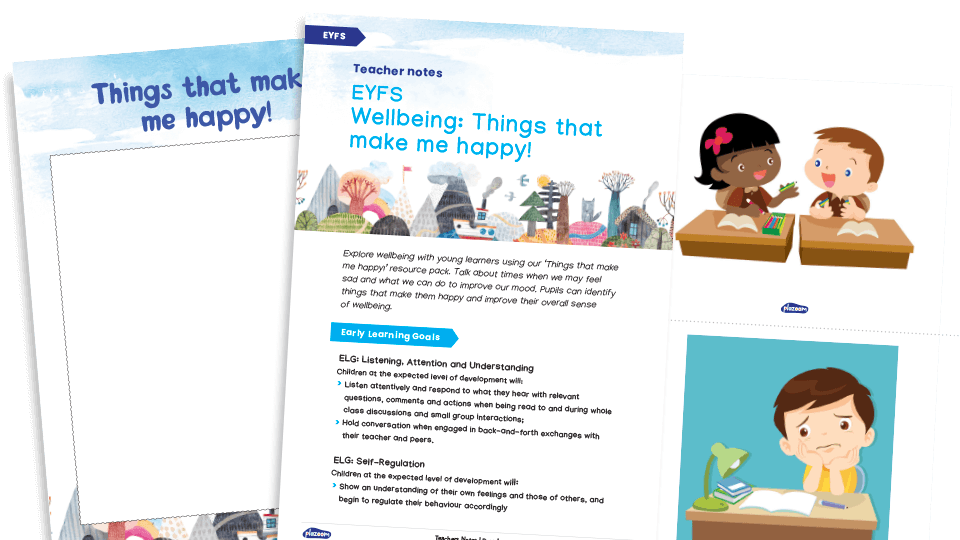
Explore wellbeing in EYFS with this free ‘Things that make me happy!’ resource pack from Plazoom. Talk about times when we may feel sad and what we can do to improve our mood.
Mental health and wellbeing worksheets
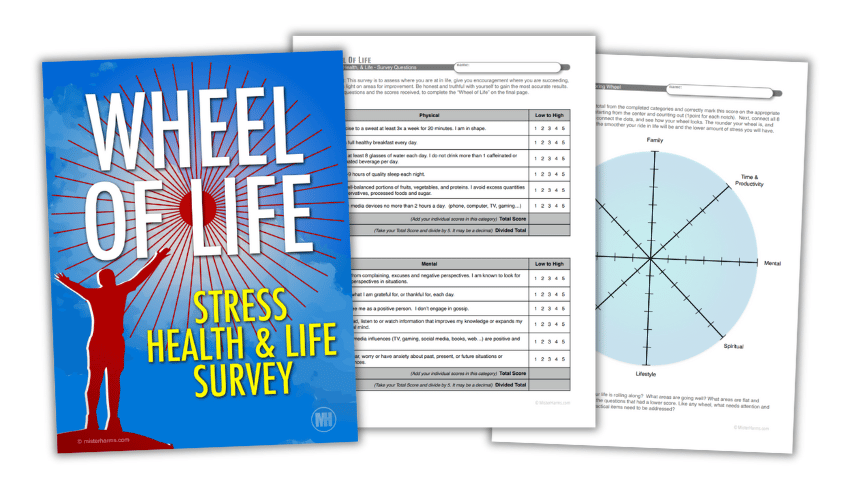
How are your students’ lives rolling along? Which areas are going well and which areas need attention? Find out with this reflective Wheel of Life activity. Download the free worksheets.
Self-esteem resources
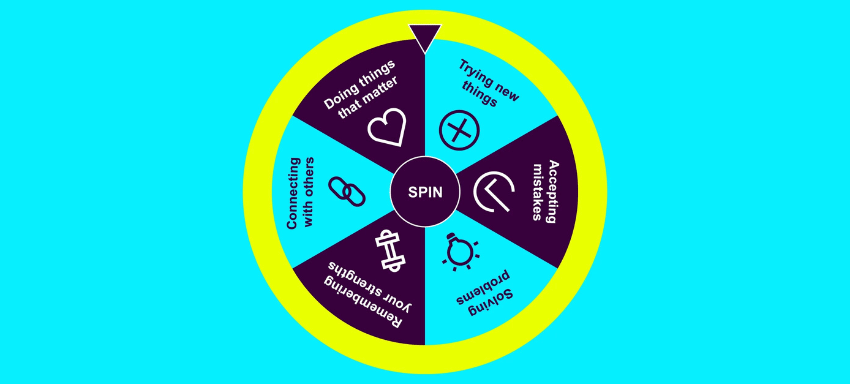
Premier League Primary Stars’ Building Self-Esteem resource helps primary pupils understand and strengthen their self-esteem.
It has been created with input from PSHE experts and teachers and aligns with the KS2 PSHE curriculum in England.
The resource includes engaging content like youth voice films, where young people explore the topic in relatable language, and videos from Premier League players such as Jordan Pickford, Eddie Nketiah and Archie Gray, who share their personal reflections on self-esteem.
Five-minute yoga routine
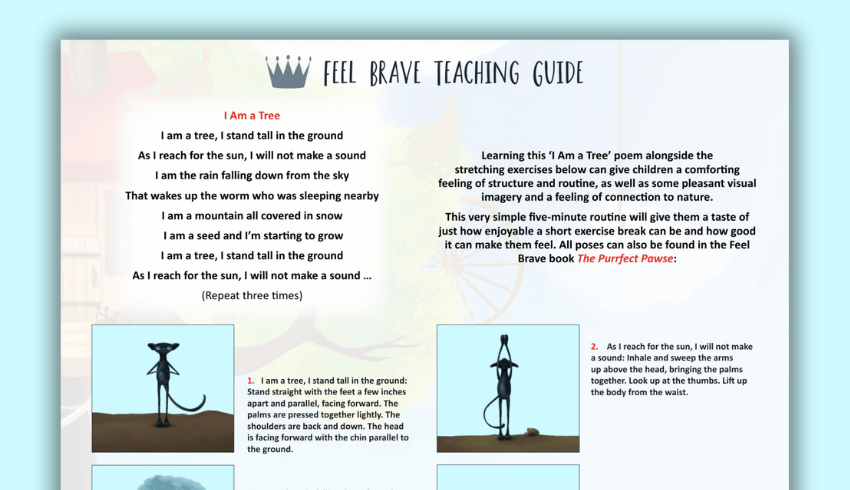
Looking to bring yoga into your primary school? This thoughtfully-designed five-minute yoga routine blends movement, breathwork, and poetry to lead children through a calming series of nature-inspired stretches.
Mindful moments with Sesame Street
Sesame Workshop’s Mindful Moments video, created for Children’s Mental Health Week, encourages children to celebrate themselves, others and what makes them happy.
After watching this video, try asking pupils these questions:
- What would your best day ever look like?
- What are your favourite things?
- How do your favourite things make you feel? Happy? Excited?
- What are you most proud of that you’ve done today?
Browse more Mindful Moments resources.
Mental health posters
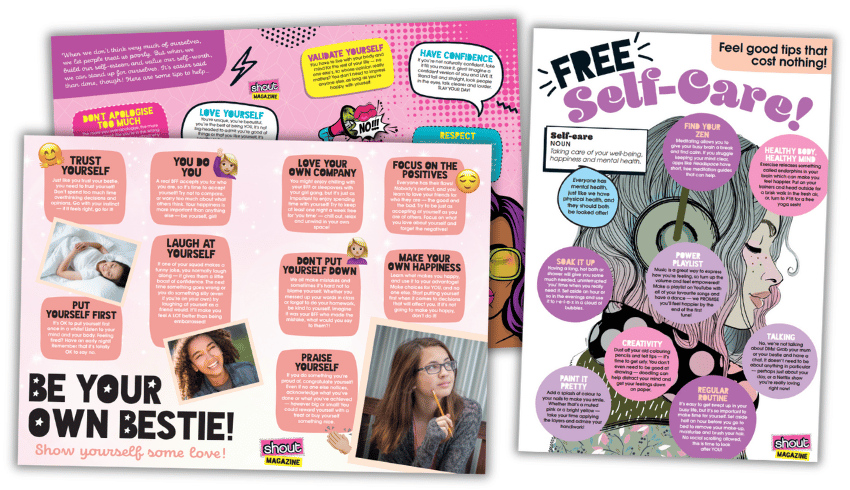
These free mental health posters focus on self-care and self-respect. Use them in PSHE lessons or as wall displays. There are three PDFs included:
- Self-care guide
- Empowerment and self-respect guide
- Be your own bestie guide
Wellbeing toolkit for primary schools
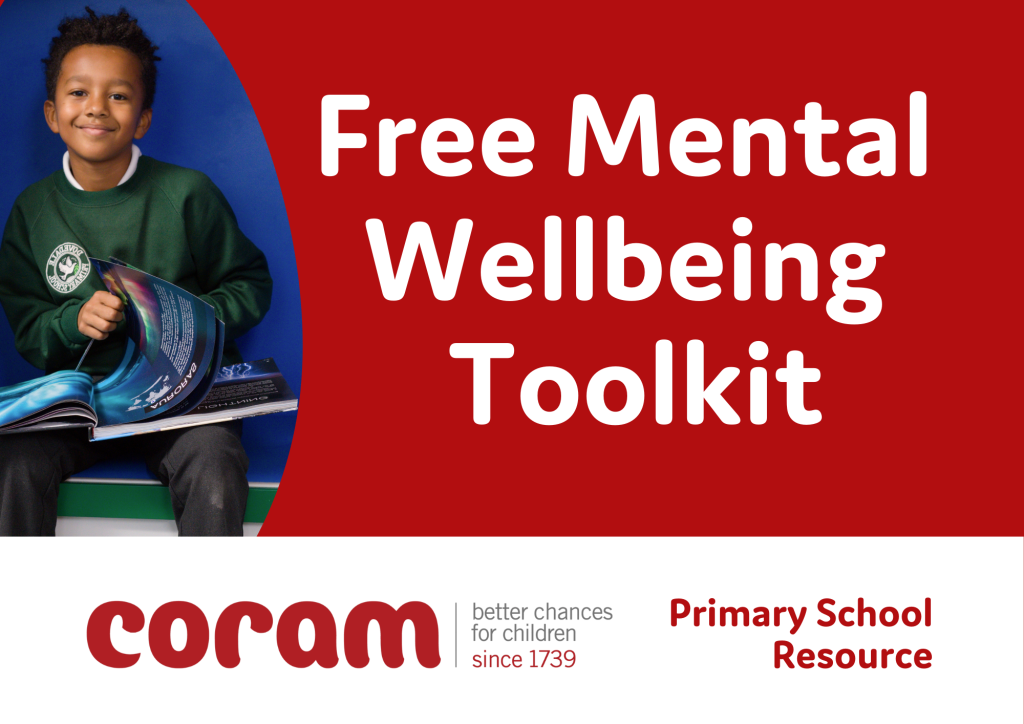
Three education charities have joined forces to launch a free online wellbeing toolkit based on the NHS framework for primary schools. It’s designed to support children’s mental wellbeing and boost resilience.
There are lots of resources, lesson plans and activities adapted for different ages and the toolkit is split into five sections: Connect with others; Be active; Take notice (mindfulness); Learn and create; Give to others.
Teaching about feelings KS1 unit
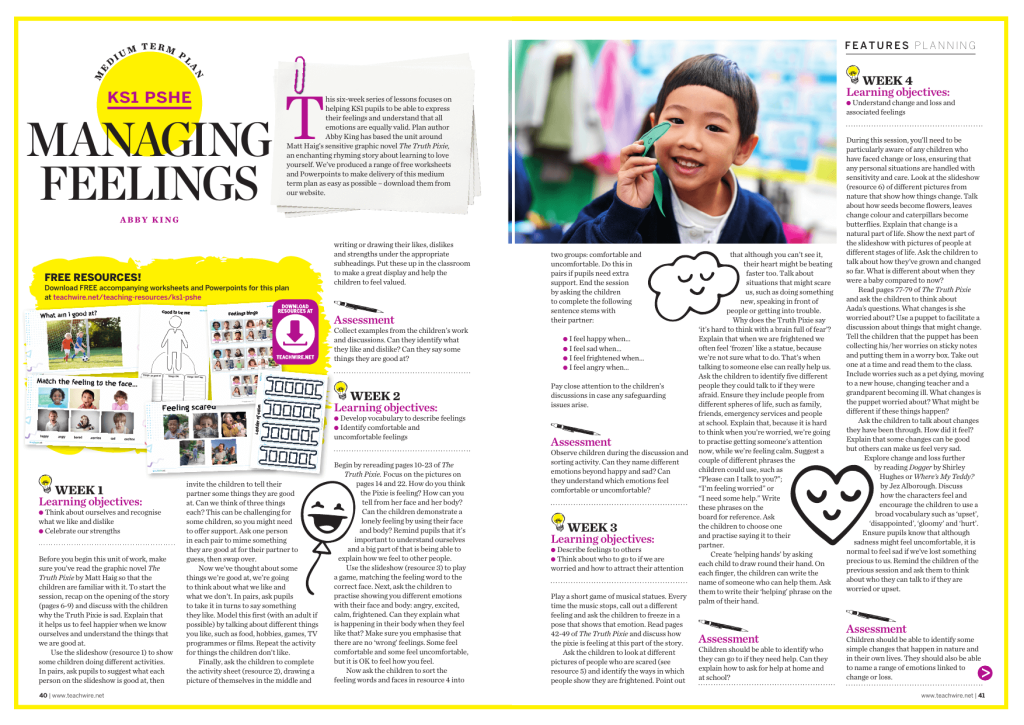
This free six-week series of lessons will help you to teach about feelings in KS1. The lessons focus on helping children to be able to express themselves and understand that all emotions are equally valid. Accompanying PowerPoints and worksheets are included in the download.
Assembly and activities for KS1 and KS2
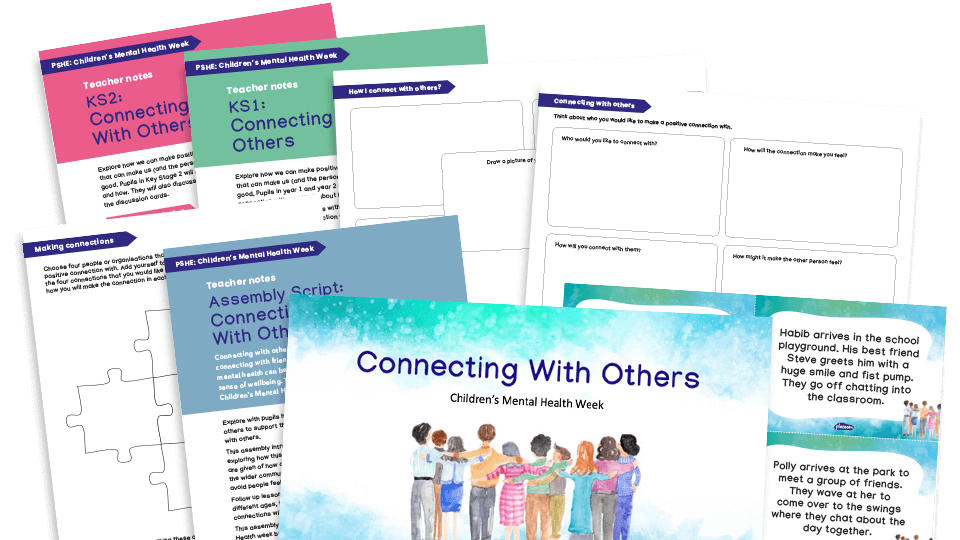
This whole-school resource from Plazoom is based around a theme of connecting with others. Children will find out why connecting with other people is vital for our wellbeing.
The pack contains an assembly to introduce the theme, plus activities with teaching notes for both KS1 and KS2.
Mental health lead year planner
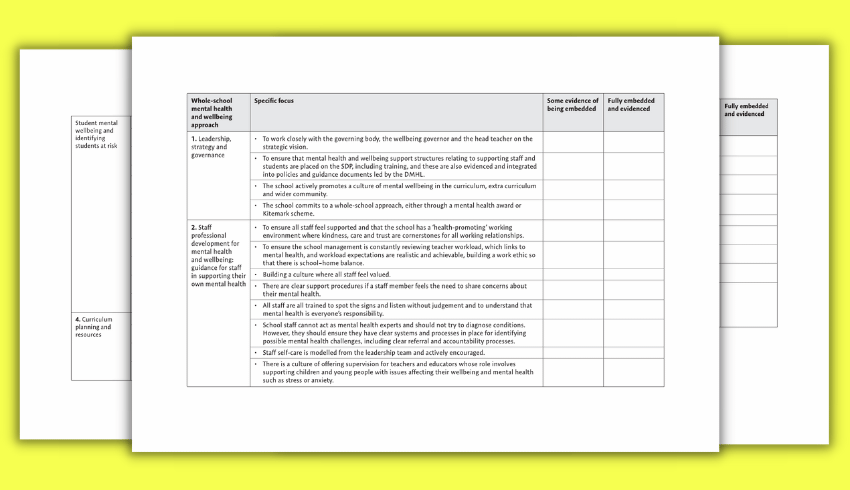
If you’re the designated mental health lead at your school it’s vital that you have a plan that feeds into your school development plan (SDP). Use this free, printable template to lay out your yearly tasks.
Mental health training resources
Free webinar

In 2023, Dr Katy Cole and Ashley Grinham-Smith ran a free webinar, exploring ways to support mental health and wellbeing in primary school settings. The webinar covered anxiety and how it presents within school, or through school avoidance.
You can go back and watch this webinar, and a previous webinar about the role school leaders can play in ensuring good mental health and wellbeing for all.
How to pick a counsellor for your school

Catherine Roche, chief executive of children’s mental health charity Place2Be, lays out what to look for when selecting a mental health counsellor…
Teachers aren’t mental health experts and no one should expect you to be. But you need the skills to keep an eye on the mental health of your class and spot problems early.
It’s also important that you know where to turn if more serious issues present themselves.
Training initiatives like our Mental Health Champions programme can also help you focus on making changes that make your school more mentally healthy overall.
The Mentally Healthy Schools website is a one-stop shop for resources that primary schools can use to support emotional wellbeing.
Professional support
As well as training, you should be able to call on advice and support from a professional.
At Place2Be our in-school service provides what one teacher called “the longer term, systemic approach as opposed the spur of the moment, six-week anger management course”.
Here are some important points to consider when choosing a counsellor for your school:
- Read the DfE’s guidance for schools about setting up counselling services. Also look at the counselling section of the Mentally Healthy Schools website.
- Ask other local school staff about their experience and what they recommend. Could you group together to commission a counselling service?
- Check out what services are available in your community, including agencies, charities, organisations and individuals.
- Make sure any counsellor you employ is registered and accredited with one of the recognised professional bodies, such as the BACP or UKCP. This ensures they have met certain training and qualification standards, are working to an ethical framework, have supervision requirements and are subject to a complaints procedure. You could even use the search engines on the BACP or UKCP websites.
- Check the counsellor has training in working with children, is confident working with parents and carers and is qualified to at least Diploma level.
7 ways to boost mental health and wellbeing for everyone in your school

Dr Margot Sunderland, director of The Centre for Child Mental Health (CCMH) and co-director of Trauma Informed Schools UK, shares advice for how leaders can create a school environment that’s beneficial for everyone’s mental health, including their own…
No doubt about it – senior leadership is a difficult job. There aren’t many tougher than ensuring the school is a mentally healthy environment in which to teach, learn and prosper.
And there’s your own mental wellbeing to consider.
Again, no easy task. An Education Support Partnership Teacher Wellbeing Index reported a dramatic increase in the mental health problems of headteachers, with 45% of senior leaders feeling stressed most or all of the time.
You play a vital role in creating a happy, nurturing learning space for staff and pupils, so it’s crucial that you know how to improve and maintain mental health, both for your own sake and that of others. So here are some tips to help you.
1 | Consider therapy or counselling
How can you support teachers and pupils if your own mental health is poor? You must prioritise your own psychological support.
Counselling sessions where you can off-load, weep and rage to a trained professional will reduce your toxic stress. It will improve your own state of mind and ensure that you can support others’ mental health.
2 | Valued teachers
Make sure your teachers feel appreciated for their contribution to the school. Research proves feeling valued contributes to good mental health, while shame triggers the same reaction in the body as a physical injury.
A practical way to show teachers you value them is to reward their successes and issue commendations to senior staff. Knowing that your hard work matters and is appreciated is a morale boost for anyone.
3 | Help ‘lone’ teachers
If teachers don’t have regular access to a teaching assistant, this can mean they are a ‘single parent’ of as many as 30 children.
Teaching solo is isolating. Loneliness triggers the panic/grief system in the brain which can lead to panic attacks.
To help these ‘lone teachers’ feel supported and emotionally regulated by other teachers, organise regular talk-time groups where staff feel comfortable enough to discuss feelings of impotence, loneliness, abandonment and lack of recognition.
You can also seek creative solutions to improve staff-pupil ratios by recruiting volunteers or teaching apprentices.
Another idea is advertising for teaching assistants – volunteer parent or grandparent helpers – who have proved to be a warm, empathic and calming presence for teachers and pupils.
4 | Bring down toxic stress
A quick ‘there-there’ chat in the corridor before a teacher’s next lesson won’t be sufficient to reduce toxic stress levels.
It’s important to ensure staff have daily access to an oxytocin (anti-stress neurochemical) releasing environment on a daily basis. They also need time to use it built into the school timetable.
Provide them with ‘reflect and restore rooms’ – they aren’t expensive to set up. Include the following elements to trigger oxytocin and opioids (euphoria-inducing enkephalins and endorphins):
- warm lights (uplighters)
- colours
- soothing music
- lovely smells
- comforting fabric
- external warmth (such as electric blankets)
- open fire DVD
Also remember children with troubled home lives may not arrive at school in an emotional state conducive to learning. There are many fun and easy ways to reduce the toxic stress levels of vulnerable pupils.
The following interventions – best implemented at the beginning of the school day – support learning. They also protect against toxic stress-induced physical and mental illness:
- accompanied drumming
- tai chi
- mindfulness
- meditation rooms
- sensory play
- spending time with animals or outside.
5 | Emotionally-available adults
Social buffering – daily and easy access to at least one specific emotionally available adult – is a key factor in preventing mental ill-health in children.
Ensure all vulnerable pupils have a designated adult in whom to confide and that they know where and when to find that member of staff.
If the child doesn’t take to the designated adult, find an alternative person.
6 | Reduce exam stress
To reduce exam stress – particularly around pressure points such as SATs – emphasise to pupils that their self-worth and the worth of others can’t be measured by test results.
Communicate this throughout the whole school so that all pupils receive this message.
Formally value individual children for their own special qualities and strengths. This could include kindness, generosity, perseverance and explorative drive.
7 | Positive discipline
As we know, discipline such as isolation rooms don’t work and instead tend to harm pupils with mental health problems or a high adverse childhood experience (ACE) score.
Countless research shows that isolation, sensory deprivation and feeling shamed is detrimental to mental and physical health.
In contrast, using disciplinary methods such as restorative conversations is highly effective in decreasing behavioural problems and exclusions. They also help develop pro-social skills and the lifelong ability to manage stress.
Making mental health a year-round priority

Yvonne Kekeliadis, founder of Brightstarz, explores how to use the momentum of Children’s Mental Health Week to bolster students’ self-esteem and confidence…
After a disruptive few years for schools, many students are now facing an uphill battle to regain confidence in their academic and personal lives. This is on top of the growing issue of young people facing sharp declines in their confidence and self-esteem as they get older.
What is confidence?
One of the leading issues many young people face in building their confidence is not knowing exactly what confidence means.
It’s a term that’s regularly conflated with a tendency to show off, but young people can and should be taught to be proud of their achievements, and supported in being happy with who they are.
“Young people can and should be taught to be proud of their achievements”
Children and young people sometimes don’t understand what it takes to be confident. It doesn’t require you to be the best at everything, but rather be proud of what makes you different.
At the heart of mental health support around confidence and self-esteem should be an effort to teach young people what it means to believe in themselves.
Challenges to confidence
It’s also important to be aware of the fact that many young people can face competing challenges to their self-esteem. These challenges will differ from student to student, and likely change over time as new trends arise.
The evolution of social media, for example, has profoundly changed the way in which young girls now develop low self-esteem regarding the way they look.
Previously, schools might have tried to teach their students not to compare themselves to portrayals in films or magazines, given their artificiality and inaccurate depictions of real life
With social media, however, many young people are failing to apply those lessons to the posts they see each day. This is despite the fact that those Instagram posts are more often than not just as carefully constructed and edited as any magazine photo shoot.
These ever-changing challenges mean it’s imperative that you stay up to date with the latest trends impacting upon the confidence of young people.
Overcoming failure and building resilience
An important aspect of building self-confidence is overcoming the fear of failure.
Throughout their time in education, it’s inevitable that children and young people will occasionally fail at a task – that’s how we learn.
To overcome this fear, students need to learn about the positives of failure. They need to see it as an opportunity to learn something new, rather than it being a negative indictment of their ability.
“It’s imperative that schools stay up to date with the latest trends impacting upon the confidence of young people”
This focus on being scared to fail is core to the support young people will need in the lead-up to their exams.
In our self-confidence workshops, we draw upon examples from popular culture and the lives of our participants to show the minimal impact one single failure can have on the rest of a person’s life.
We teach students about the ways in which they can look at failure as an obstacle that can be overcome. We also cover how to recognise learnings they can then take forward.
Supporting students in developing a more positive mindset towards both failure and success is a vital skill which will stand them in good stead for all aspects of later life and adulthood.
Mental health and wellbeing efforts remain a year-round issue for schools. Take a look at your school’s wellbeing provision. Ensure you’re offering students a helping hand that can boost their confidence and really help them learn how to tackle challenges to their self-esteem, instead of simply raising awareness of the issue.










